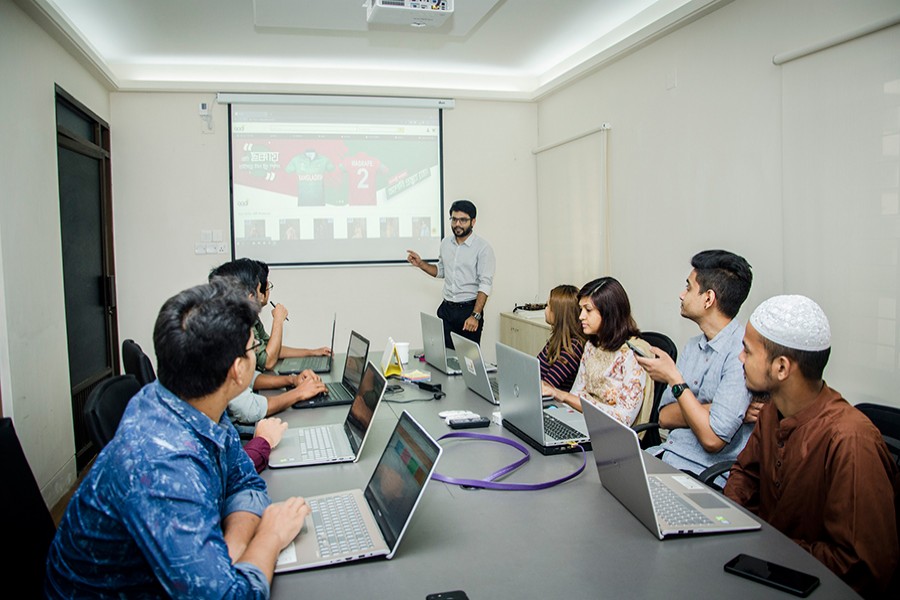The global economy is dynamic due to ever-changing consumer behaviour. A new trend can change the economic situation of Bangladesh.
Mehedi Hasan, a business graduate from IBA, University of Dhaka and also an entrepreneur with several years of industry experience as a marketing and branding professional, has started, with others, their new venture — Aadi. He sees the vast potential of the e-commerce market and he believes this country can boost economic growth through it.
Research results lead to an idea
Global courier delivery giant DHL conducted research through renowned consulting firm McKinsey. The study showed that due to e-commerce—a business format that makes retailers redundant—globally B2B (Buyer to Buyer) businesses are going down and B2C (Buyer to Consumer) businesses are on the rise. A manufacturer can now be directly connected to their customers. Until the recent past, DHL only operated B2B in Bangladesh, and the global trend alarmed DHL for its Bangladeshi market. Therefore, they began to look for any Bangladeshi platform that would send products on a B2C basis across international borders. However, Bangladesh did not have any such platform.
The DHL representative of Bangladesh talked to Mehedi Hasan and discussed this issue. Mr. Hasan then formulated a vision and joined six other like-minded and industry experienced people to fill this market void. With the help of DHL, these people started Aadi, the first ever-cross border marketplace from Bangladesh so that consumers staying outside Bangladesh can purchase Bangladeshi products from manufacturers through Aadi.
Start of the journey
Mr. Hasan said "NRBs (Non-Residential Bangladeshis) are going to be Aadi's initial target. They will recognise a Bangladeshi platform, and they require products such as saree, punjabi etc. while not being able to access those abroad. They will also have seasonal demand, for instance now they will want the Bangladesh cricket team jersey. We will work to fulfil these demands."
Aadi has already started wonderfully by selling the national cricket team jerseys to NRBs around the world. A homesick Bangladeshi customer from Canada wrote in a review, "I ordered a World Cup jersey from Canada. The price was very reasonable, including shipping, and it was shipped quick. I am really happy with the service."
Mr. Hasan stated that Aadi would only target NRBs for the first three years, a 100 million-plus consumer base with ethnic fast fashion products and seasonal demand products like jerseys. If they make purchases from Aadi and are satisfied, the word-of- mouth promotion from them will help broaden the customer base to non-Bangladeshi consumers.
Current situation
Total e-commerce sales is surged to US$ 29 trillion in 2017 according to UNCTAD (United Nations Conference on Trade and Development). The cross border B2C e-commerce market makes up 11 per cent of that and experiences consistent growth. China claims more than US$ 01 trillion of the B2C e-commerce market, according to 2017 research data from UNCTAD.
Interestingly Bangladesh being the world's second largest exporter of RMG is yet to contribute cross border e-commerce. Bangladesh does not have any established global B2C brand and thereby has no access to this vast and growing market. This is a gap that current e-commerce companies of Bangladesh like Daraz, Bikroy have not filled, they only cater to domestic demand. "We are not concerned about local trade; our purpose is cross-border trade," said Mr. Hasan. Aadi is, therefore, aiming to go for the uncharted territory compared to the contemporary e-commerce companies in Bangladesh.
Upcoming business expansions
"Aadi is going to become Amazon's official contact point of Bangladesh. If any Bangladeshi manufacturer wants to sell through Amazon, they will have to do it through Aadi. This helps us because it is hard to attract Bangladeshi manufacturers using its relatively new name, but it is much easier to do it using the name of Amazon. We want to become the Bangladeshi Amazon," said Mr. Hasan. Amazon also benefits, as it believes that the only country that can beat China at prices in the B2C market in Bangladesh. The business goal of Aadi will be an E2E solution. Sellers will be initially RMG manufacturers and later artisans as well. Secured payments will be ensured with banking partner EBL. DHL will be the logistics partner and will provide worldwide shipping at a special rate. In addition, Aadi's revenue will initially only be commission and may later expand to other revenue channels like advertisements.
Long-term vision
Garments manufacturers of our country make products for globally recognised brands. However, they only get roughly 20 per cent of the final price to the consumer. 80 per cent of Bangladesh's export revenue depends on RMG export. "The absence of a Bangladeshi brand means that these exports can be lost if another country starts to produce at a lower price," stated Mr. Hasan.
To create a sustainable export revenue stream, Bangladeshi garments brands are essential. Mr. Hasan added, "Today people pay a lot of money for Levis jeans, a product made in Bangladesh. Tomorrow we want to ensure that people pay that kind of money for a Bangladeshi brand's product."
Aadi's long-term goal is taking Bangladesh to a US$ 200 billion contribution in the cross border e-commerce trade by 2023.
Challenges
"Consumer markets in the EU and America have strict quality standards. Bangladeshi manufacturers adhere to quality standards when foreign buyers specify them but are not so careful otherwise," replied Mr. Hasan when asked about challenges. Ensuring that manufacturers treat this market accordingly is key to the success, he commented.
The writer is a second year
student of BBA programme at the Institute of Business Administration (IBA), University of Dhaka. He can be reached at [email protected]


